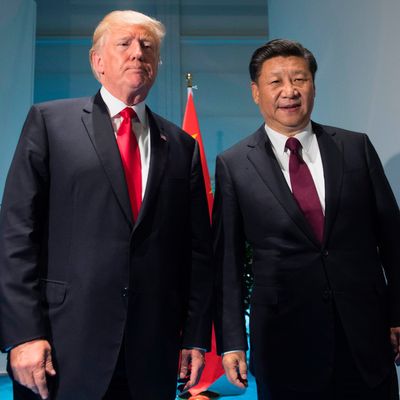
As threatened, the Trump administration took a big step today toward a full-on trade war with China, as the Associated Press reported:
President Donald Trump’s latest tariff hike on Chinese goods took effect Friday and Beijing said it would retaliate, escalating a battle over China’s technology ambitions and other trade tensions.
The Trump administration raised duties on $200 billion of Chinese imports to 25% from 10%. China’s Commerce Ministry said it would impose “necessary countermeasures” but gave no details.
The increase went ahead even after American and Chinese negotiators began more talks in Washington aimed at ending a dispute that has disrupted billions of dollars in trade and shaken global financial markets.
The new tariffs will affect such products as electronics, medical devices, seafood, clothing, and handbags. Retaliation is certain if still unclear, as the Los Angeles Times observes:
China currently has tariffs in place on $110 billion of U.S. goods. Retaliation could mean raising tariffs, broadening tariffs to different kinds of imports or using administrative means to suspend or delay projects and purchase contracts already underway.
Meanwhile, the president is treating the imposition of new tariffs as a positive end in itself, in a tweet that managed to sideswipe potential 2020 opponent Joe Biden:
Talks are continuing, though, as Don Lee reports:
The onset of new duties ends a cease-fire agreed to by President Trump and Chinese President Xi Jinping six months ago after a series of tit-for-tat tariff actions. And it increases the odds of a full-on trade war between the two largest economies that would have ripple effects around the world.
The White House, however, issued a short statement late Thursday indicating that the two sides would keep talking, led by U.S. Trade Representative Robert Lighthizer and Xi’s chief trade negotiator, Liu He.
And as Lee notes, both sides are under pressure to reach a deal and to maintain a strong negotiating position:
On the one hand, both Trump and Xi have economic incentives to reach a resolution. The trade conflict has hurt farmers and businesses and could potentially cause considerable damage to the economies of both countries …
A full-blown trade war … will test the patience of even some of Trump’s staunchest supporters, and Trump himself is known to be particularly sensitive to stock market gyrations.
Xi, for his part, may feel his back is almost against the wall. He is trying to deal with a host of domestic financial and social challenges. Xi wants to see solid economic growth and technological advances that would help maintain the Communist Party’s grip on power.
The assortment of mixed signals from both Washington and Beijing could intensify market jitters. While Trump might regard higher tariffs as a financial windfall paid by foreigners, the more conventional view is that they represent an unwanted tax paid by U.S. consumers and a threat to stable overseas markets for U.S. exports.
Trump’s willingness to risk a trade war that could spin out of control is one of the shadows in the sunshine of the current U.S. economic outlook. It’s a shame he seems to enjoy this sort of brinkmanship so much.






























